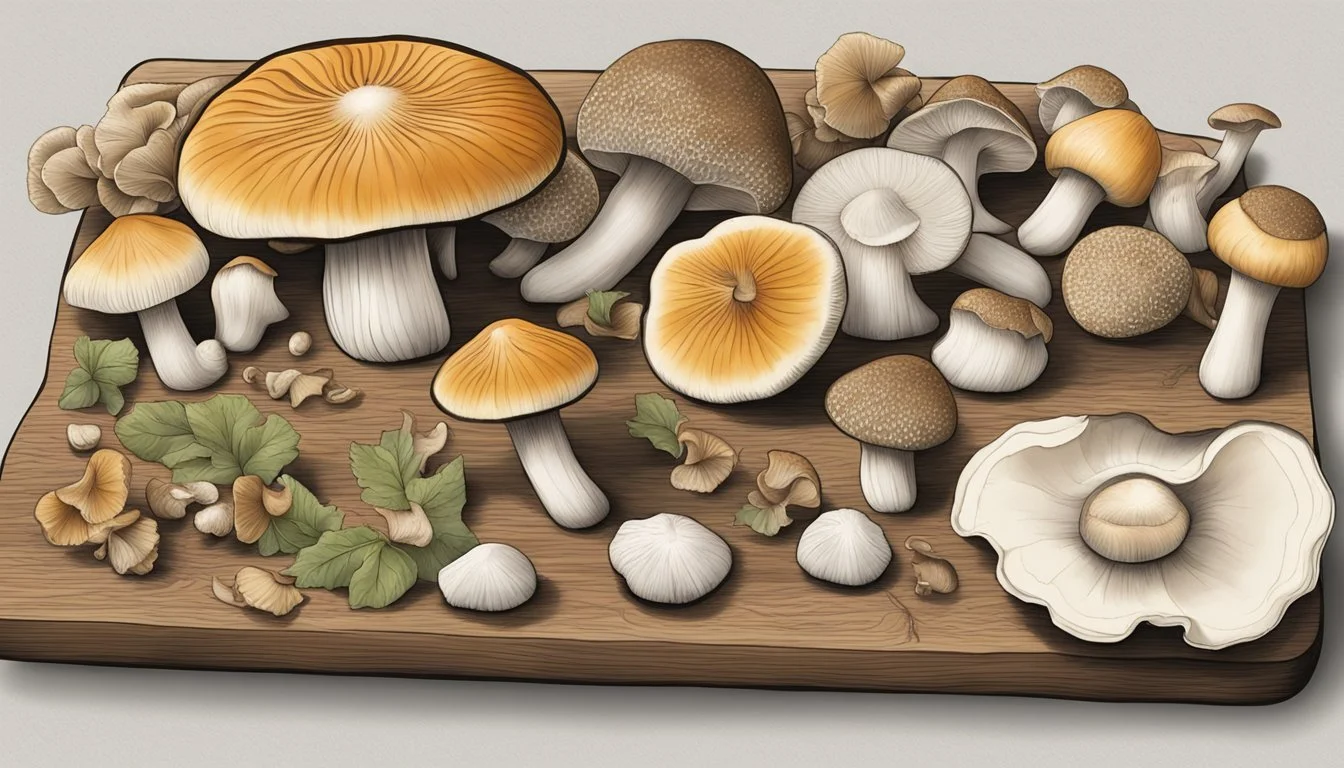Oyster Mushrooms Substitutes
Top Alternatives for Flavor and Texture
Finding the right substitute for oyster mushrooms can elevate your dish without compromising on taste and texture. For food enthusiasts who find themselves out of oyster mushrooms or looking to experiment, several alternatives can seamlessly take their place. Maitake mushrooms, also known as "Hen of the Woods," offer a meaty texture and nutty flavor that works well in various recipes.
Portabella mushrooms are another excellent choice, especially for their robust, meaty taste, making them ideal for vegetarian and vegan dishes. Eggplant and firm tofu are versatile non-mushroom options that absorb flavors beautifully, providing both texture and volume to any meal. These substitutes ensure your culinary creations remain delicious and satisfying, even without the original ingredient.
Understanding Oyster Mushrooms
Oyster mushrooms are famed for their unique texture and earthy, umami flavor. They are incredibly versatile in culinary applications and offer significant nutritional benefits to dishes.
Texture and Taste Profile
Oyster mushrooms boast a meaty texture that makes them a popular ingredient in vegan and vegetarian recipes.
Their flesh is tender yet firm, providing a pleasant bite. The taste is earthy with a pronounced umami flavor, often likened to seafood, hence the name. Their flavor profile enhances various dishes, making them a favorite among chefs.
Culinary Uses
In the kitchen, oyster mushrooms shine due to their versatility.
They are perfect for stir-fries, soups, sauces, and salads. They absorb flavors exceptionally well, which makes them ideal for various recipes. When cooked, they add a hearty, meaty taste to the dish, providing depth and richness.
Nutritional Benefits
Oyster mushrooms are not just flavorful; they are also packed with nutrients.
They are low in calories but high in protein, vitamins, and minerals. Rich in B vitamins, they support energy levels and metabolism. Additionally, they contain antioxidants and fiber, contributing to overall health. These attributes make them an excellent choice for anyone looking to boost their diet with nutritious options.
Popular Oyster Mushroom Substitutes
When oyster mushrooms are unavailable, there are several excellent alternatives that can step in, offering similar textures and flavors. These substitutes can enhance a variety of dishes, from stir-fries to soups, ensuring a rich and satisfying culinary experience.
Shiitake Mushrooms
Shiitake mushrooms are a top choice for replacing oyster mushrooms. Known for their rich umami flavor, shiitakes bring depth to dishes. They have a meaty texture, making them ideal for hearty recipes. Shiitakes are best in stir-fries, soups, and stews.
Available fresh or dried, shiitakes can be rehydrated to use as needed. They hold up well to long cooking times, maintaining their texture. Simply slice and sauté, or simmer in broths to release their full flavor potential.
Portobello and Cremini Mushrooms
Portobello and cremini mushrooms are versatile substitutes. Portobellos are large with a thick, meaty texture, perfect for grilling, making burgers, or topping pizzas. Their robust flavor pairs well with many ingredients.
Creminis are smaller and similar in flavor but slightly milder. They work well in various dishes, from sautéed sides to main courses. Both types absorb marinades effectively, making them adaptable for different cuisines.
Morel and Chanterelle Mushrooms
Morel and chanterelle mushrooms offer unique flavors as substitutes. Morels have an earthy, nutty taste, and a honeycomb texture. They are excellent in creamy sauces, risottos, and as a garnish for gourmet dishes.
Chanterelles bring a delicate, slightly peppery flavor and a chewy texture. They are best sautéed with butter and herbs, used in egg dishes, or as a sophisticated addition to sauces. Both types are seasonal and pricier, but their distinct flavors elevate any dish significantly.
Unique Oyster Mushroom Substitutes
When oyster mushrooms are unavailable, certain alternatives can replicate their texture and flavor well. Among the best choices are matsutake and porcini mushrooms, enoki and maitake mushrooms, and abalone and king oyster mushrooms.
Matsutake and Porcini Mushrooms
Matsutake mushrooms offer a robust and spicy flavor that can enhance any dish requiring oyster mushrooms. Their firm texture stands up well to grilling and roasting, making them ideal for hearty recipes. Porcini mushrooms, known for their earthy and nutty taste, provide a deep umami flavor. Porcini's meaty texture makes them a superb addition to stews and risottos. Both options are excellent for replacing oyster mushrooms in recipes that benefit from bold, wild mushroom flavors.
Enoki and Maitake Mushrooms
Enoki mushrooms possess a delicate, almost crunchy texture that contrasts with the tenderness of oyster mushrooms. Despite this difference, they work well in salads, stir-fries, and soups, where they absorb flavors nicely. Maitake mushrooms, also known as hen-of-the-woods, offer a slightly peppery and rich taste. Their more complex flavor profile can add depth to many dishes. Maitake's versatility makes it suitable as a direct 1:1 oyster mushroom substitute in various culinary contexts.
Abalone and King Oyster Mushrooms
Abalone mushrooms have a unique fan-shaped appearance and a crunchy texture that sets them apart. Their savory flavor and nutritive value, filled with vitamins and proteins, make them a healthy oyster mushroom substitute. King oyster mushrooms, known for their meaty and firm consistency, are perfect for grilling and searing. Their subtle taste allows them to absorb sauces effectively, making them a fantastic swap in recipes that highlight the mushroom's own flavor. Both abalone and king oyster mushrooms provide the meatiness and savoriness that can elevate any dish.
Plant-Based and Other Substitutes
Plant-based substitutes for oyster mushrooms provide diverse and versatile alternatives for vegan and vegetarian dishes. These options not only mimic the texture but also enhance the flavors of various recipes, from stir-fries to pasta dishes.
Tofu and Tempeh Options
Tofu and tempeh are excellent choices as meat substitutes. Firm tofu can replicate the texture of oyster mushrooms due to its dense, sponge-like structure. This makes it ideal for soaking up flavors from marinades and sauces. Tempeh, made from fermented soybeans, provides a firmer texture and a nuttier taste, adding depth to any dish. When using tofu or tempeh as substitutes, they can be used in a 1:1 ratio to replace oyster mushrooms in various recipes.
Eggplant: Versatility and Flavor
Eggplant is a versatile option when looking for a substitute for oyster mushrooms. This vegetable turns tender once cooked and acts as a flavor sponge, absorbing sauces well. It provides a similar mouthfeel due to its naturally soft texture when cooked. Eggplant is especially suitable for stir-fries and pasta dishes, adapting well to different culinary styles. It is a particularly good match for recipes that require a substantial, meaty component without using actual meat.
Flavor Enhancers and Sauces
To achieve the umami profile akin to oyster mushrooms, flavor enhancers and sauces are crucial. Soy sauce and oyster sauce, both common in Asian cuisine, offer rich umami tastes that can boost the overall flavor of any dish. For a vegan option, mushroom-based sauces or Worcestershire sauce can be used. Combining these sauces with eggplant, tofu, or tempeh enhances their ability to mimic the complex taste of oyster mushrooms, making them excellent substitutes in a variety of dishes.
Considerations When Choosing Substitutes
Choosing the right substitute for oyster mushrooms involves evaluating the flavor profile as well as the texture and consistency of the alternative ingredients. This helps ensure that the overall dish remains as close to the original as possible.
Matching the Flavor Profile
Oyster mushrooms have a mild, slightly sweet, and nutty flavor with an underlying umami profile. They are known for their seafood-like taste, which makes them unique in various recipes.
Portabella mushrooms offer a rich, meaty taste with deep umami notes. They work well in dishes needing a robust flavor.
Chanterelles provide a slightly peppery and earthy flavor, making them a good match for recipes with a similar taste requirement.
Maitake mushrooms have a strong earthy and slightly spicy profile that can add complexity to soups, stir-fries, and sautés.
Enoki mushrooms are milder, with a subtle fruity flavor, best used in fresh or lightly cooked dishes.
Texture and Consistency Considerations
The texture of oyster mushrooms is chewy yet tender, which is crucial for replacing them without altering the overall mouthfeel of the dish.
Firm tofu can replicate the dense and firm texture of oyster mushrooms, especially in stir-fries and stews.
Tempeh, with its grainy and chewy texture, mimics the consistency and adds a nutty flavor that can enhance the dish.
Eggplant becomes tender and spongy when cooked, absorbing flavors well, making it a good substitute in saucy dishes.
Portabella mushrooms maintain a dense and meaty texture, which suits hearty dishes like casseroles and grilled recipes.
Professional Applications
Oyster mushroom substitutes play a crucial role in various professional culinary and content creation settings. These alternatives not only diversify menu offerings but also provide valuable insights for food enthusiasts and industry professionals alike.
Hospitality and Catering
In the hospitality and catering industry, versatility in ingredients is key. Personal chefs and caterers often encounter clients with specific dietary needs or preferences. Substitutes like eggplant, firm tofu, and maitake mushrooms enhance a dish's volume and flavor diversity.
Restaurants utilize these substitutes to maintain consistency when oyster mushrooms are unavailable. Caterers appreciate the adaptability of these options, especially in large-scale events where ingredient consistency is vital. Using portabella mushrooms can achieve a meaty taste that mimics oyster mushrooms, thus ensuring a satisfying culinary experience for vegan and vegetarian clients.
Content Creation and Food Writing
Content creators and food writers need comprehensive resources on ingredient substitutes to offer valuable culinary tips. Reviewing and experimenting with substitutes like enoki mushrooms and tempeh can lead to informative product recommendations and engaging restaurant reviews.
For food enthusiasts, detailed guides on using these substitutes in recipes add significant value. Writers focus on the distinctive qualities of each substitute, providing practical advice on ratios and flavor profiles. By integrating these insights into their work, they contribute to the richness of the culinary landscape, helping readers enjoy varied and innovative dishes.
Cost and Availability
Oyster mushrooms can vary significantly in price depending on the region, season, and whether they are cultivated or foraged. Generally, cultivated oyster mushrooms are more affordable and widely available.
In many grocery stores, they are priced at $5-$10 per pound, which makes them accessible for most home cooks. Farmers' markets and specialty stores might have slightly higher prices due to the superior freshness and quality of the mushrooms.
Foraging for oyster mushrooms can be an exciting and cost-effective alternative, although it requires knowledge and experience. They are commonly found on decaying logs and trees in temperate and subtropical forests. Foraged mushrooms add a unique taste to dishes and can sometimes be found for free if you know where to look.
Availability also varies with the season. Cultivated oyster mushrooms are available year-round in most regions. Foraged oyster mushrooms are typically found in the wild during the cooler months of spring and fall.
Comparatively, substitutes like shiitake mushrooms and portobello mushrooms are usually less expensive. For instance, shiitakes can be found for around $4-$8 per pound, providing a cost-effective alternative for recipes requiring oyster mushrooms.
An easy-to-read table summarizes some pricing:
Mushroom Type Price per Pound Cultivated Oyster $5 - $10 Foraged Oyster Variable, often free Shiitake $4 - $8 Portobello $3 - $7
When considering substitutes, it's important to account for both the cost and the flavor profile to ensure the desired outcome in your dishes.






